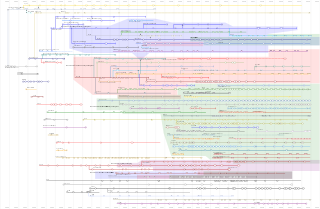Mathematical Markup Language (MathML) is a mathematical markup language, an application of XML for describing mathematical notations and capturing both its structure and content. It aims at integrating mathematical formulae into World Wide Web pages and other documents. It is part of HTML5 and an ISO standard ISO/IEC 40314 since 2015.

A screen reader is a form of assistive technology (AT) that renders text and image content as speech or braille output. Screen readers are essential to people who are blind, and are useful to people who are visually impaired, illiterate, or have a learning disability. Screen readers are software applications that attempt to convey what people with normal eyesight see on a display to their users via non-visual means, like text-to-speech, sound icons, or a Braille device. They do this by applying a wide variety of techniques that include, for example, interacting with dedicated accessibility APIs, using various operating system features, and employing hooking techniques.

A browser war is competition for dominance in the usage share of web browsers. The "First Browser War" during the late 1990s pitted Microsoft's Internet Explorer against Netscape's Navigator. Browser wars continued with the decline of Internet Explorer's market share and the popularity of other browsers including Firefox, Google Chrome, Safari, Microsoft Edge and Opera.

Minimo was a project to create a version of the Mozilla web browser for small devices like personal digital assistants and mobile phones.
Mozilla Firefox has features that allow it to be distinguished from other web browsers, such as Chrome and Internet Explorer.
Netscape Plugin Application Programming Interface (NPAPI) is an application programming interface (API) of the Web Browsers that allows plugins to be integrated.
NoScript is a free software extension for Mozilla Firefox, SeaMonkey, other Mozilla-based web browsers and Google Chrome, created and maintained by Giorgio Maone, an Italian software developer and member of the Mozilla Security Group.

Dojo Toolkit is an open-source modular JavaScript library designed to ease the rapid development of cross-platform, JavaScript/Ajax-based applications and web sites. It was started by Alex Russell, Dylan Schiemann, David Schontzler, and others in 2004 and is dual-licensed under the modified BSD license or the Academic Free License.
NonVisual Desktop Access (NVDA) is a free and open-source, portable screen reader for Microsoft Windows. The project was started by Michael Curran in 2006.
A self-voicing application is an application that provides an aural interface without requiring a separate screen reader. Self-voicing applications can be an important form of assistive technology, useful to those who have difficulty reading or seeing.
AsciiMath is a client-side mathematical markup language for displaying mathematical expressions in web browsers.
Web Accessibility Initiative – Accessible Rich Internet Applications (WAI-ARIA) is a technical specification published by the World Wide Web Consortium (W3C) that specifies how to increase the accessibility of web pages, in particular, dynamic content, and user interface components developed with Ajax, HTML, JavaScript, and related technologies.
AxsJAX is an open source JavaScript library for enhancing the accessibility of Web 2.0 applications.

Vaadin is an open-source web application development platform for Java. Vaadin includes a set of Web Components, a Java web framework, and a set of tools that enable developers to implement modern web graphical user interfaces (GUI) using the Java programming language only, TypeScript only, or a combination of both.

MathJax is a cross-browser JavaScript library that displays mathematical notation in web browsers, using MathML, LaTeX and ASCIIMathML markup. MathJax is released as open-source software under the Apache License.
HTML5 can be used as an alternative to some of the functionality of Adobe Flash. Both include features for playing audio and video within web pages. Flash is specifically built to integrate vector graphics and light games in a web page, features that HTML5 also supports.
Content Security Policy (CSP) is a computer security standard introduced to prevent cross-site scripting (XSS), clickjacking and other code injection attacks resulting from execution of malicious content in the trusted web page context. It is a Candidate Recommendation of the W3C working group on Web Application Security, widely supported by modern web browsers. CSP provides a standard method for website owners to declare approved origins of content that browsers should be allowed to load on that website—covered types are JavaScript, CSS, HTML frames, web workers, fonts, images, embeddable objects such as Java applets, ActiveX, audio and video files, and other HTML5 features.

Mozilla is a free software community founded in 1998 by members of Netscape. The Mozilla community uses, develops, spreads and supports Mozilla products, thereby promoting exclusively free software and open standards, with only minor exceptions. The community is supported institutionally by the non-profit Mozilla Foundation and its tax-paying subsidiary, the Mozilla Corporation.

A progressive web application (PWA), commonly known as a progressive web app, is a type of application software delivered through the web, built using common web technologies including HTML, CSS, JavaScript, and WebAssembly. It is intended to work on any platform that uses a standards-compliant browser, including both desktop and mobile devices.
This is a list of articles related to the JavaScript programming language.







